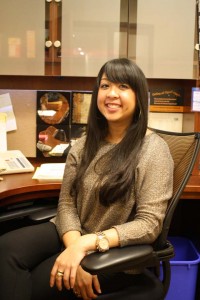From dancers and artists to those looking toward government and nonprofit, Princeton hosts a smorgasbord of interests on campus. However, when it comes to searching for a job or internship, some choose to leave those interests behind in pursuit of a more “traditional” job.
But we don’t have to.
Meet Abigail Racelis, Career Service’s new Assistant Director for the Arts, Nonprofit, and the Public Sector. Since joining the team this July, Abbey has dedicated herself to bringing non-traditional job and internship opportunities to campus for students interested in creative writing, dance, theater, visual arts, and the nonprofit and public sectors.
 “My main vision is to be an advocate for all students, but especially those who are thinking about pursuing what some would call ‘non-traditional’ careers. My goal is to bring more exposure to (and add to) all the great things Career Services offers for students interested in the arts, nonprofit, and public sectors. I hope to use my previous industry experience and interest in the arts, social justice issues, and policy mixed with my student a airs background to help bring something new to Career Services for Princeton students.”
“My main vision is to be an advocate for all students, but especially those who are thinking about pursuing what some would call ‘non-traditional’ careers. My goal is to bring more exposure to (and add to) all the great things Career Services offers for students interested in the arts, nonprofit, and public sectors. I hope to use my previous industry experience and interest in the arts, social justice issues, and policy mixed with my student a airs background to help bring something new to Career Services for Princeton students.”
If you were pleasantly surprised to see more flyers in your inbox regarding opportunities in fields like nonprofit, visual arts or fashion, thank Abbey. Since beginning her new role, she has worked tirelessly to inform students about unique fields of employment and build on-campus recruiting networks with new companies. In addition to meeting with students individually in her role as a career counselor, she has already coordinated several campus events, including a panel on Careers in Visual Arts, the Christie’s Information Session, panels on Nonprofit and Government Internships, and she just facilitated a panel on Careers in Fashion last week. All of these events were very popular with students.
“We brought in the VP of Marketing for Lacoste, the Merchandise Planner from the Gilt Groupe, the Executive Vice President of Sales and Logistics from Rosie Pope Maternity, an Assistant Buyer from Michael Kors, and a Production Manager at Ralph Lauren,” all of whom are recent Princeton alumni. Contrary to popular belief, it’s rather common for Princeton students to pursue careers in creative industries, she explains, especially on the business side.
“Students can use their analytical, critical thinking, and communication skills, as well as expand and explore their creativity while gaining exposure to industries that are fast-paced, high energy, and dynamic,” she said.
Abbey’s own career path provides a wealth of ‘in-the-biz’ experience. After graduating from the University of Connecticut, she moved to New York City and embarked on a career in fashion. She started out as an account executive in sales for one of the top childrenswear manufacturers, working on small “mom-and-pop” accounts and gradually moving up to the big department store accounts, like Dillard’s and Macy’s. Her position working with character licensing and eventually as a merchandiser gave her unique exposure to both the sales and design sides of fashion.
In addition to her experience in fashion, Abbey has always nurtured a lifelong involvement in the arts, especially dance. Growing up as a dancer in the conservatory world, part of her decision to move to New York involved pursuing a career in dance. While working a full-time job she also performed in some off-Broadway productions as a back-up dancer, appeared on Good Morning America, took (and still continues to take) countless classes at Broadway Dance Center and workshops with various choreographers, and even spent a summer working at the School of American Ballet “pursuing a childhood dream in a different perspective.”
Abbey’s interest in career counseling sparked while she was working in fashion and was appointed Internship Director for a childrenswear company. “I needed interns and started recruiting at universities in the city. It was when I was going to the career fairs, recruiting, and working with my interns that I realized I loved working with students.” So, leaving the Big Apple behind, she headed for Bowling Green, Ohio to get her masters in Higher Education and Student Affairs.
After working for a few years at Bowling Green State University and the University of Michigan in academic advising, Career Services, and athletics, she found herself at Princeton. “I love the students here and getting to know their stories. I think they’re inspiring and they’re doing a lot of things here that I would have never thought to do as an undergrad. They’re very ambitious, intelligent, and very motivated; I’m excited to see the students grow.”
This new, smiling, fashionably dressed member of Career Services has much to offer students in fields as diverse as they are. “I’m really excited about this role. Everyone’s career path, just like mine, is not perfectly linear– there will be unexpected twists and turns. My main goal is to be someone that students can feel comfortable coming to and talking about their future with.”
Students can schedule an appointment to meet with Abbey by using the online scheduling system on the Career Services website.

